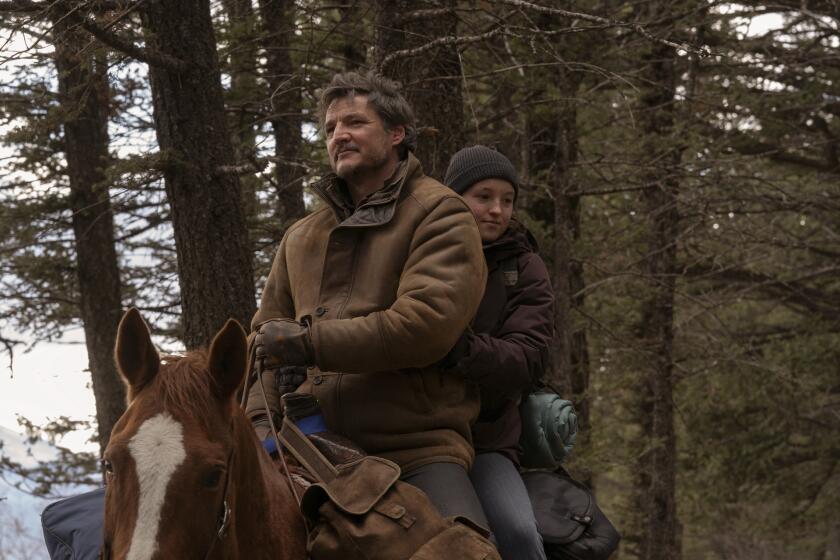GREEK ACTORS USE BODY ENGLISH IN ACTIVE VERSION OF EURIPIDES
- Share via
SOLANA BEACH — There is no shortage of bloodshed and blindness in the works of Euripides. But then, neither was there a shortage of such things in the world he lived in.
For the last 25 years of the playwright’s life, the Peloponnesian War raged between Sparta and Athens. After condemning barbarities on both sides through a series of plays on the Trojan War, Euripides left his native Athens for Macedonia in 408 B.C., never to return. There, near the small village of Pidna, he completed his last play, “Bacchae,” the story of a ruler torn apart by a passion--exemplified by the god Dionysus--that the man seeks to deny in himself and others. The playwright died in 406 B.C., two years before the Peloponnesian War ended.
Greek director Theodoros Terzopoulos brings his own memories to his Atis Theater’s production of “Bacchae,” which will have its U.S. premiere at the Mandell Weiss Center for the Performing Arts tonight.
Like the ancient playwright, Terzopoulos lived near Pidna during a Greek civil war. In his case, the conflict followed on the heels of World War II.
It was a war that ended with the torture of Terzopoulos’ father, guards in his home and the deaths of many relatives and friends. It also brought back the memory of the ancient myths in a painful way.
“In ancient Greece, Dionysus came to liberate Thebes. In modern Greek history, he could not do it,” the director said.
“So the suppressed energy of the people who were defeated had to come out. It came out in fiestas and local celebrations.”
Terzopoulos speculates that Euripides may have seen earlier and bloodier versions of the Dionysian rituals in Pidna that he himself saw in the post-civil war period of 1949-1960.
Speaking softly in the mansion of Marianne McDonald, the Greek scholar responsible for bringing his troupe to UC San Diego, Terzopoulos intersperses his Greek with English, using expansive hand gestures and looking toward the actor playing Dionysus, Akis Zakellariou, for help in the translation.
Zakellariou listens to the director intently, then summarizes: “In all of what he is saying, the basic element is the element of thanatos --death. The element of death is what characterizes our performance.
“Dionysus is not a drunk or a god who wants to have a party. It’s a deeper experience of those who have met death. . . . It is the ecstasy of the defeated.”
Terzopoulos says he hopes to convey this ecstasy by striving for what he calls “total body movement”--the goal of his 2-year-old Atis Theater.
The show, which will be performed in Leonidas Zennakos’ modern Greek translation, will include above-the-waist nudity by the five-member troupe. And, instead of following in what Terzopoulos calls the European tradition of speech-oriented theater, he is modeling his work on ancient Greek dances and rituals that feature the body as “the shrine of the spiragmos or ‘rending apart’ ” that he sees as the heart of the play.
For instance, Terzopoulos and his troupe believe that continuous feet stomping can, ultimately, induce a trance that the ancient Greeks used as a form of anesthesia. By stopping short of collapse, they say the nerves take over and discover tremblings that are unique to different parts of the body, such as the hand, arm and foot.
Terzopoulos calls his commitment to movement the route to the ancient Greek performances that began to disappear with the fall of ancient Rome.
“I try to find the way to the old play by drawing on the emotional memory of the people as it is imprinted in the body,” Terzopoulos says.
“Thousands of years ago they might have torn apart an animal or a person. In the mind, it’s all the same.”
For the actors, who discover their own potential for involuntary movement, this can mean it is equally dangerous. According to Zakellariou, “We need someone outside to watch and guard us. You can come to a point where you might lose all your senses. You can go insane.”
Terzopoulos notes that this production was well-received in Cyprus, Austria, Spain, Japan, Australia and Germany--most countries, in fact, except that of its nativity, Greece, where it played at the Ancient Stadium of Delphi and the Demetria Festival in Thessaloniki.
That does not seem to dismay the director who relates his plans to bring the play back home, in a revised fashion, for another presentation.
“Some people are finally understanding it there,” he said, smiling.
More to Read
The biggest entertainment stories
Get our big stories about Hollywood, film, television, music, arts, culture and more right in your inbox as soon as they publish.
You may occasionally receive promotional content from the Los Angeles Times.










